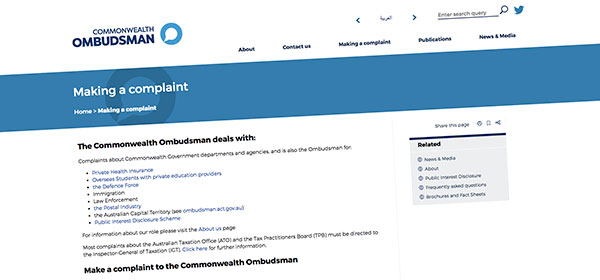The body that mediates disputes over health insurance is a toothless tiger, the competition watchdog’s recently tabled report has revealed.
The Australian Competition and Consumer Commission (ACCC) noted in its latest inquiry into the sector that “there has been a substantial increase in complaints over the past three years” against health insurers.
The report emerged in the same week that consumer group CHOICE released findings from an investigation which concluded that Australians were being short-changed by private health insurers.
After scrutinising the extras cover policies of 23 funds, CHOICE found more than 70 per cent of benefits paid “stagnated in value in the three years from 2013, despite Australians paying 19 per cent more”.
In a submission to the ACCC inquiry, the Private Health Insurance Ombudsman (PHIO) said most of the gripes it handled in the period probed July 2015 to June 2016 were over the level of benefits that insurers failed to provide.
However, while the PHIO can investigate disputes over health insurance, it has no enforceable powers. Because it does not have legislated authority to penalise companies which misbehave, the PHIO can only make recommendations.
On the other hand, non-government, industry-funded ombudsmen can impose fines and penalties against companies which breach best-practice codes.
It seems the PHIO appears content with its role as a wrist-slapper, as it told the ACCC it considers its job “is focused more on negotiating outcomes … rather than assigning fault and applying a penalty or fine to one party”.
The body claimed it would be counterproductive to its role of protecting consumers if it were able to issue penalties.
Curiously, a call for the PHIO to behave more like an industry-funded ombudsman came from the unlikely corner of health fund HCF – a business which could potentially find itself on the receiving end of a penalty if a case went against it.
HCF told the inquiry it was unfair that the PHIO’s reporting methodology did not reveal the outcomes of its investigations.
“This means consumers are not given the opportunity to fairly appraise the complaints handling of a health insurer,” said HCF.
The insurer suggested PHIO consider a reporting approach similar to the industry-funded Financial Ombudsman Service (FOS), which lists dispute outcomes.
From July next year, the FOS will be folded into a new body that will also take in the functions of the industry-funded Credit and Investments Ombudsman and statutory body Superannuation Complaints Tribunal, which is not industry-funded, but has the clout of the Australian Securities and Investments Commission (ASIC) to enforce its determinations.
It is proposed that the new body, the Australian Financial Complaints Authority, should have the power to increase compensation amounts.
Ironically, the submission from peak body for insurance companies Private Healthcare Australia (PHA) has not called for the establishment of an industry-funded ombudsman for the sector, even though it told the ACCC that PHIO “complaints are not a valid measure of consumer satisfaction with private health insurance”.
However, the association goes on to say it supports the PHIO as “an important resource”.
It then backflips again and concludes that the complaints sent to the PHIO “should not be viewed as a quantitative authority on the industry’s performance”.
YourLifeChoices has asked PHA if would support any calls for a non-statutory umpire for the health insurance sector.
The peak group’s slapdown of PHIO complaints is curious, because if anything, the ombudsman regularly downplays the significance of policyholder dissatisfaction with the ‘nothing-to-see-here’ line: “the number of complaints received is very small compared to fund membership”.
Even its parent statutory authority, the Commonwealth Ombudsman, pronounced in its last annual report that 85 per cent of people who complained to the PHIO “were satisfied or very satisfied with the handling of their complaints”.
Presumably, some of the 15 per cent who weren’t satisfied made up the 169 health insurance cases the ACCC ended up “seemingly grudgingly” dealing with. As it stated in its report: “The ACCC is not a dispute resolution body and does not generally receive a large number of complaints in relation to private health insurance.”
Yet complaints are increasing rapidly. In the year to the end of June 2016, there were 4416 complaints, up 50 per cent from the 2955 lodged three years prior.
And judging by the observations of the Australian Medical Association (AMA), this trend may continue.
In a stark and topical warning – given the Republican Party’s attack on Obamacare – the AMA told the ACCC inquiry that insurers were “moving private health care in Australia towards a system similar to that of the US – managed care”.
“Market power is slowly shifting in favour of the private health insurers; they are deciding who can provide what treatment and where they can provide it. Health insurers should not interfere with the clinical judgement of medical practitioners. Private health insurance should serve the needs of health consumers, who have paid for it, not industry shareholders,” the AMA asserted.
In April, the AMA released a ‘report card’ on the health insurance sector, urging policyholders to do their homework and “know exactly what they are covered for in the event of accident, illness, or injury”.
Have you ever been treated unfairly by a private health insurer? How was your complaint handled? Should Australians demand an industry-funded ombudsman with powers to penalise badly behaved health insurers?
Related articles:
Do I still need health insurance
What’s not covered
Funds profit soars on premium hikes

